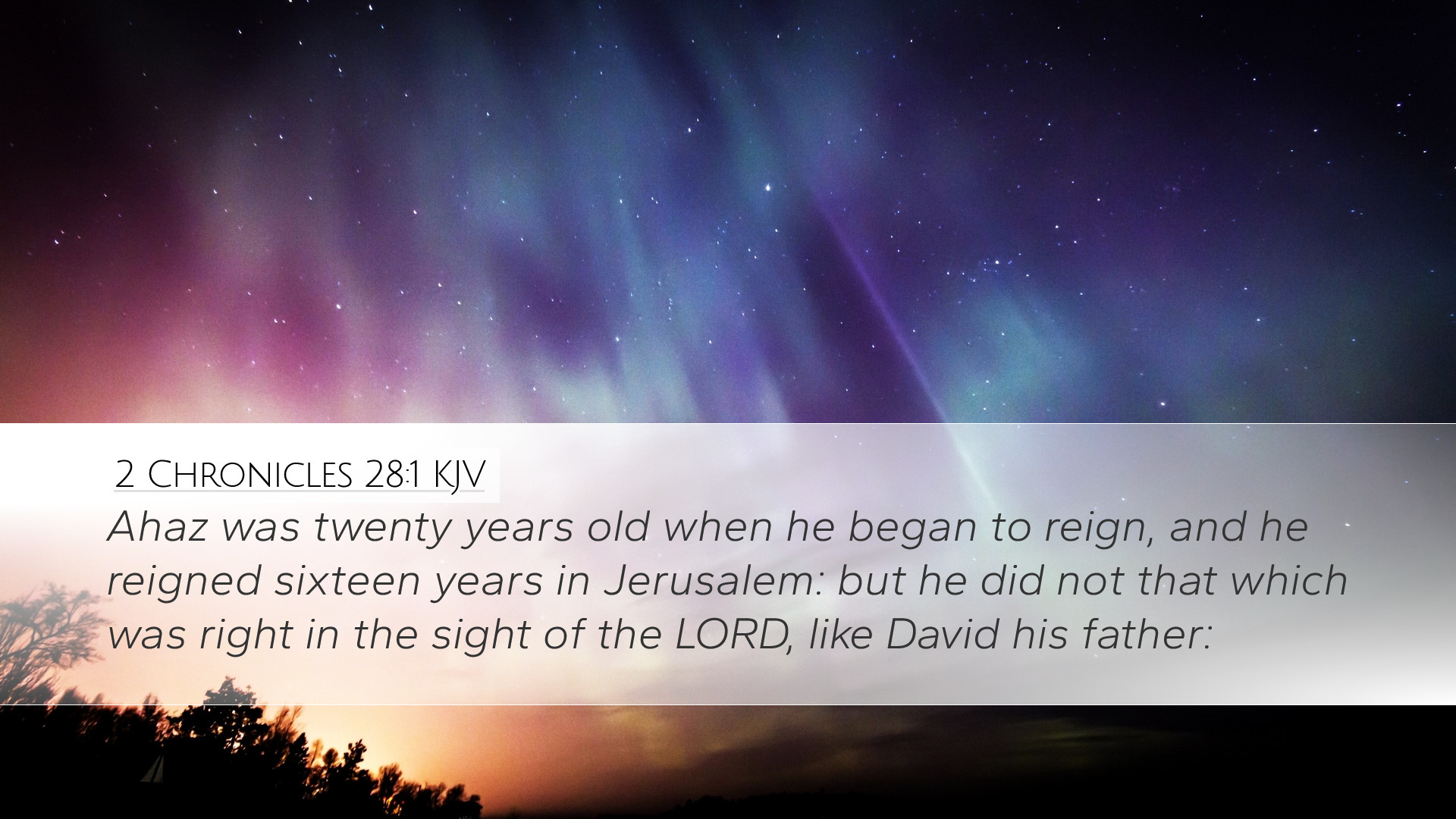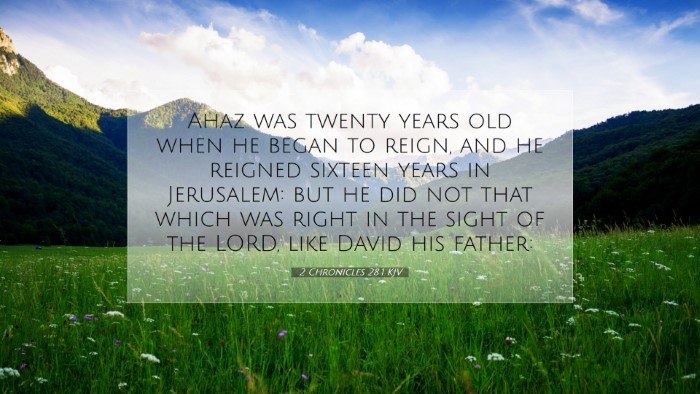Commentary on 2 Chronicles 28:1
2 Chronicles 28:1 states:
"Ahaz was twenty years old when he began to reign, and he reigned sixteen years in Jerusalem: but he did not that which was right in the sight of the Lord, like David his father."
Introduction
This verse introduces King Ahaz of Judah, marking the beginning of a turbulent reign characterized by idolatry and practices opposed to the worship prescribed in the Mosaic Law. Commentary on this passage provides insights into Ahaz’s life, the socio-political context of his reign, and its implications for understanding the nature of leadership and covenant relationship with God.
Contextual Background
Ahaz's rule must be understood against the backdrop of a divided kingdom of Israel and Judah. The tensions between these two nations were heightened during Ahaz's reign, exacerbated by the threats from neighboring nations like Israel and Syria. As a young king, Ahaz was confronted with challenges that tested his faith and reliance on God.
King Ahaz: A Profile
- Age and Duration of Reign: Ahaz ascended to the throne at the young age of twenty and ruled for sixteen years. This youthfulness could explain some of his poor decisions stemming from inexperience.
- Comparison with David: The text starkly contrasts Ahaz with his ancestor David, highlighting his failure to follow in the righteous ways of his forefather. This comparison serves as a theological and moral benchmark for the reader.
- Spiritual Disobedience: King Ahaz is noted for his disobedience, emphasizing a critical theme in Chronicles where kings are often evaluated based on their fidelity to God.
Theological Themes
Several key theological themes can be extracted from 2 Chronicles 28:1:
- The Cause of Idolatry: Ahaz's reign is representative of the larger tendency of Israel to turn towards idolatry. This serves as a reminder to leaders and nations of the continuous struggle against the temptations of surrounding cultures.
- The Impact of Leadership: The verse illustrates that the character and choices of leaders significantly affect the spiritual health of a nation. Ahaz’s failure led to disastrous consequences for Judah.
- Divine Judgment and Mercy: Even amidst his failures, the chronicler points to God’s presence and the potential for repentance and restoration, underscoring the themes of judgment and mercy throughout 2 Chronicles.
Insights from Commentators
Matthew Henry
Henry highlights the contrast between Ahaz and the ideal king, David. He emphasizes that Ahaz did not follow the righteous path, which illustrates that positive legacy is determined not just by heritage but by personal choices and actions. Henry notes the importance of evaluating one’s own life against biblical standards.
Albert Barnes
Barnes points out that the age of the king reflects the challenges faced by youthful leaders in times of crisis. He suggests that the specific mention of Ahaz's evil ways serves as a warning to future leaders regarding the perils of straying from God’s commandments. Barnes also stresses the significance of the phrase "like David," implying that following God’s will brings blessings, while turning away leads to devastation.
Adam Clarke
Clarke elucidates on the socio-political implications of Ahaz's reign, detailing how his alliance with Assyria led to increased idolatry and disregard for the covenant relationship with Yahweh. Clarke's analysis indicates the dire consequences of secular alliances, echoing a theme relevant for contemporary readers regarding faith reliance over political strategies.
Application for Today
For pastors, students, and scholars, 2 Chronicles 28:1 serves as a vital reflection on leadership, the importance of maintaining spiritual integrity, and the impact of personal choices on a community. The text challenges modern readers to consider the weight of their leadership roles—whether in churches, communities, or families—and the responsibility to uphold a lifestyle consistent with biblical principles.
Church leaders are particularly reminded to model their lives after Christ—who fulfills and surpasses David's legacy—while being wary of the culture's influence that often seeks to legitimize disobedience to God's Word.


